- Home
- Joseph Conrad
Heart of Darkness and the Congo Diary (Penguin Classics) Page 8
Heart of Darkness and the Congo Diary (Penguin Classics) Read online
Page 8
“I did not see the real significance of that wreck at once. I fancy I see it now,56 but I am not sure—not at all. Certainly the affair was too stupid—when I think of it—to be altogether natural. Still…But at the moment it presented itself simply as a confounded nuisance. The steamer was sunk. They had started two days before in a sudden hurry up the river with the manager on board, in charge of some volunteer skipper, and before they had been out three hours they tore the bottom out of her on stones, and she sank near the south bank. I asked myself what I was to do there, now my boat was lost. As a matter of fact, I had plenty to do in fishing my command out of the river. I had to set about it the very next day. That, and the repairs when I brought the pieces to the station, took some months.
“My first interview with the manager was curious. He did not ask me to sit down after my twenty-mile walk that morning. He was commonplace in complexion, in feature, in manner, and in voice.e18 He was of middle size and of ordinary build. His eyes, of the usual blue, were perhaps remarkably cold, and he certainly could make his glance fall on one as trenchant and heavy as an axe. But even at these times the rest of his person seemed to disclaim the intention. Otherwise there was only an indefinable, faint expression of his lips, something stealthy—a smile—not a smile—I remember it, but I can’t explain. It was unconscious, this smile was, though just after he had said something it got intensified for an instant.e19 It came at the end of his speeches like a seal applied on the words to make the meaning of the commonest phrase appear absolutely inscrutable. He was a common trader,57 from his youth up employed in these parts—nothing more. He was obeyed, yet he inspired neither love nor fear, nor even respect. He inspired uneasiness. That was it! Uneasiness. Not a definite mistrust—just uneasiness—nothing more. You have no idea how effective such a…a…
faculty can be. He had no genius for organising, for initiative, or for order even. That was evident in such things as the deplorable state of the station. He had no learning, and no intelligence. His position had come to him—why? Perhaps because he was never ill…He had served three terms of three years out there…Because triumphant health in the general rout of constitutions is a kind of power in itself. When he went home on leave he rioted on a large scale—pompously. Jack ashore58—with a difference—in externals only. This one could gather from his casual talk. He originated nothing, he could keep the routine going—that’s all. But he was great. He was great by this little thing that it was impossible to tell what could control such a man. He never gave that secret away. Perhaps there was nothing within him. Such a suspicion made one pause—for out there there were no external checks. Once when various tropical diseases had laid low almost every ‘agent’ in the station, he was heard to say, ‘Men who come out here should have no entrails.’ He sealed the utterance with that smile of his, as though it had been a door opening into a darkness he had in his keeping. You fancied you had seen things—but the seal was on. When annoyed at meal-times by the constant quarrels of the white men about precedence, he ordered an immense round table to be made, for which a special house had to be built. This was the station’s mess-room. Where he sat was the first place—the rest were nowhere. One felt this to be his unalterable conviction.e20 He was neither civil nor uncivil. He was quiet. He allowed his ‘boy’—an overfed young negro from the coast—to treat the white men, under his very eyes, with provoking insolence.
“He began to speak as soon as he saw me. I had been very long on the road. He could not wait. Had to start without me. The up-river stations had to be relieved. There had been so many delays already that he did not know who was dead and who was alive, and how they got on—and so on, and so on. He paid no attention to my explanations, and, playing with a stick of sealing-wax, repeated several times that the situation was ‘very grave, very grave.’ There were rumours that a very important station was in jeopardy, and its chief, Mr Kurtz, was ill. Hoped it was not true. Mr Kurtz was…I felt weary and irritable. Hang Kurtz, I thought. I interrupted him by saying I had heard of Mr Kurtz on the coast. ‘Ah! So they talk of him down there,’ he murmured to himself. Then he began again, assuring me Mr Kurtz was the best agent he had, an exceptional man, of the greatest importance to the Company; therefore I could understand his anxiety. He was, he said, ‘very, very uneasy.’ Certainly he fidgeted on his chair a good deal, exclaimed, ‘Ah, Mr Kurtz!’, broke the stick of sealing-wax and seemed dumbfounded by the accident. Next thing he wanted to know ‘how long it would take to——’ I interrupted him again. Being hungry, you know, and kept on my feet too, I was getting savage. ‘How could I tell?’ I said. ‘I hadn’t even seen the wreck yet—some months, no doubt.’ All this talk seemed to me so futile. ‘Some months,’ he said. ‘Well, let us say three months before we can make a start. Yes. That ought to do the affair.’ I flung out of his hut (he lived all alone in a clay hut with a sort of verandah) muttering to myself my opinion of him. He was a chattering idiot. Afterwards I took it back when it was borne upon me startlingly with what extreme nicety he had estimated the time requisite for the ‘affair.’
“I went to work the next day, turning, so to speak, my back on that station. In that way only it seemed to me I could keep my hold on the redeeming facts of life. Still, one must look about sometimes; and then I saw this station, these men strolling aimlessly about in the sunshine of the yard. I asked myself sometimes what it all meant. They wandered here and there with their absurd long staves in their hands, like a lot of faithless pilgrims bewitched inside a rotten fence. The word ‘ivory’ rang in the air, was whispered, was sighed. You would think they were praying to it. A taint of imbecile rapacity blew through it all, like a whiff from some corpse. By Jove! I’ve never seen anything so unreal in my life. And outside, the silent wilderness surrounding this cleared speck on the earth struck me as something great and invincible, like evil or truth, waiting patiently for the passing away of this fantastic invasion.
“Oh, these months! Well, never mind. Various things happened. One evening a grass shed full of calico, cotton prints, beads, and I don’t know what else, burst into a blaze so suddenly that you would have thought the earth had opened to let an avenging fire consume all that trash. I was smoking my pipe quietly by my dismantled steamer, and saw them all cutting capers in the light, with their arms lifted high, when the stout man with moustaches came tearing down to the river, a tin pail in his hand, assured me that everybody was ‘behaving splendidly, splendidly,’ dipped about a quart of water and tore back again. I noticed there was a hole in the bottom of his pail.
“I strolled up. There was no hurry. You see the thing had gone off like a box of matches. It had been hopeless from the very first. The flame had leaped high, driven everybody back, lighted up everything—and collapsed. The shed was already a heap of embers glowing fiercely. A nigger was being beaten near by. They said he had caused the fire in some way; be that as it may, he was screeching most horribly. I saw him, later on, for several days, sitting in a bit of shade looking very sick and trying to recover himself: afterwards he arose and went out—and the wilderness without a sound took him into its bosom again. As I approached the glow from the dark I found myself at the back of two men, talking. I heard the name of Kurtz pronounced, then the words, ‘take advantage of this unfortunate accident.’ One of the men was the manager. I wished him a good evening. ‘Did you ever see anything like it—eh? it is incredible,’ he said, and walked off. The other man remained. He was a first-class agent, young, gentlemanly, a bit reserved, with a forked little beard and a hooked nose. He was stand-offish with the other agents, and they on their side said he was the manager’s spy upon them. As to me, I had hardly ever spoken to him before. We got into talk, and by and bye we strolled away from the hissing ruins. Then he asked me to his room, which was in the main building of the station. He struck a match, and I perceived that this young aristocrat had not only a silver-mounted dressing-case but also a whole candle all to himself. Just at that time the manager was the only man supposed to h
ave any right to candles. Native mats covered the clay walls; a collection of spears, assegais,59 shields, knives was hung up in trophies. The business entrusted to this fellow was the making of bricks—so I had been informed; but there wasn’t a fragment of a brick anywhere in the station, and he had been there more than a year—waiting. It seems he could not make bricks without something, I don’t know what—straw maybe.60 Anyway, it could not be found there, and as it was not likely to be sent from Europe, it did not appear clear to me what he was waiting for. An act of special creation61 perhaps. However, they were all waiting—all the sixteen or twenty pilgrims of them—for something; and upon my word it did not seem an uncongenial occupation, from the way they took it, though the only thing that ever came to them was disease—as far as I could see. They beguiled the time by backbiting62 and intriguing against each other in a foolish kind of way. There was an air of plotting about that station, but nothing came of it, of course. It was as unreal as everything else—as the philanthropic pretence of the whole concern, as their talk, as their government, as their show of work. The only real feeling was a desire to get appointed to a trading-post where ivory was to be had, so that they could earn percentages. They intrigued and slandered and hated each other only on that account—but as to effectually lifting a little finger—oh, no. By heavens! there is something after all in the world allowing one man to steal a horse while another must not look at a halter.63 Steal a horse straight out. Very well. He has done it. Perhaps he can ride. But there is a way of looking at a halter that would provoke the most charitable of saints into a kick.
“I had no idea why he wanted to be so sociable, but as we chatted in there it suddenly occurred to me the fellow was trying to get at something—in fact, pumping me. He alluded constantly to Europe, to the people I was supposed to know there—putting leading questions as to my acquaintances in the sepulchral city, and so on. His little eyes glittered like mica discs—with curiosity—though he tried to keep up a bit of superciliousness. At first I was astonished, but very soon I became also awfully curious to see what he would find out from me. I couldn’t possibly imagine what I had in me to make it worth his while. It was very pretty to see how he baffled himself, for in truth my body was full of chills, and my head had nothing in it but that wretched steamboat business. It was evident he took me for a perfectly shameless prevaricator. At last he got angry, and, to conceal a movement of furious annoyance, he yawned. I rose. Then I noticed a small sketch in oils, on a panel, representing a woman, draped and blindfolded, carrying a lighted torch.64 The background was sombre—almost black. The movement of the woman was stately, and the effect of the torchlight on the face was sinister.
“It arrested me, and he stood by, civilly holding an empty half-pint champagne bottle (medical comforts) with the candle stuck in it. To my question he said Mr Kurtz had painted this—in this very station more than a year ago—while waiting for means to go to his trading-post. ‘Tell me, pray,’ said I, ‘who is this Mr Kurtz?’
“‘The chief of the Inner Station,’ he answered in a short tone, looking away. ‘Much obliged,’ I said, laughing. ‘And you are the brickmaker of the Central Station. Every one knows that.’ He was silent for a while. ‘He is a prodigy,’ he said at last. ‘He is an emissary of pity, and science, and progress, and devil knows what else. We want,’ he began to declaim suddenly, ‘for the guidance of the cause entrusted to us by Europe, so to speak, higher intelligence, wide sympathies, a singleness of purpose.’ ‘Who says that?’ I asked. ‘Lots of them,’ he replied. ‘Some even write that; and so he comes here, a special being, as you ought to know.’ ‘Why ought I to know?’ I interrupted, really surprised. He paid no attention. ‘Yes. To-day he is chief of the best station, next year he will be assistant-manager, two years more and…but I daresay you know what he will be in two years’ time. You are of the new gang—the gang of virtue. The same people who sent him specially also recommended you. Oh, don’t say no. I’ve my own eyes to trust.’ Light dawned upon me. My dear aunt’s influential acquaintances were producing an unexpected effect upon that young man. I nearly burst into a laugh. ‘Do you read the Company’s confidential correspondence?’ I asked. He hadn’t a word to say. It was great fun. ‘When Mr Kurtz,’ I continued severely, ‘is General Manager, you won’t have the opportunity.’
“He blew the candle out suddenly, and we went outside. The moon had risen. Black figures strolled about listlessly, pouring water on the glow, whence proceeded a sound of hissing; steam ascended in the moonlight, the beaten nigger groaned somewhere. ‘What a row the brute makes!’ said the indefatigable man with the moustaches, appearing near us. ‘Serve him right. Transgression—punishment—bang! Pitiless, pitiless. That’s the only way. This will prevent all conflagrations for the future. I was just telling the manager…’ He noticed my companion, and became crestfallen all at once. ‘Not in bed yet,’ he said, with a kind of servile heartiness; ‘it’s so natural. Ha! Danger—agitation.’ He vanished. I went on to the river-side, and the other followed me. I heard a scathing murmur at my ear, ‘Heap of muffs65—go to.’ The pilgrims could be seen in knots gesticulating, discussing. Several had still their staves in their hands. I verily believe they took these sticks to bed with them. Beyond the fence the forest stood up spectrallye21 in the moonlight, and through the dim stir, through the faint sounds of that lamentable courtyard, the silence of the land went home to one’s very heart—its mystery, its greatness, the amazing reality of its concealed life. The hurt nigger moaned feebly somewhere near by, and then fetched a deep sigh that made me mend my pace away from there. I felt a hand introducing itself under my arm. ‘My dear sir,’ said the fellow, ‘I don’t want to be misunderstood, and especially by you, who will see Mr Kurtz long before I can have that pleasure. I wouldn’t like him to get a false idea of my disposition….’
“I let him run on, this papier-mâché Mephistopheles,66 and it seemed to me that if I tried I could poke my forefinger through him, and find nothing inside but a little loose dirt, maybe. He, don’t you see, had been planning to be assistant-manager by and bye under the present man, and I could see that the coming of that Kurtz had upset them both not a little. He talked precipitately, and I did not try to stop him. I had my shoulders against the wreck of my steamer, hauled up on the slope like a carcass of some big river animal. The smell of mud, of primeval mud, by Jove! was in my nostrils, the high stillness of primeval forests was before my eyes; there were shiny patches on the black creek. The moon had spread over everything a thin layer of silver—over the rank grass, over the mud, upon the wall of
matted vegetation standing higher than the wall of a temple, over the great river I could see through a sombre gap glittering, glittering, as it flowed broadly by without a murmur. All this was great, expectant, mute, while the man jabbered about himself. I wondered whether the stillness on the face of the immensity looking at us two were meant as an appeal or as a menace. What were we who had strayed in here? Could we handle that dumb thing, or would it handle us? I felt how big, how confoundedly big, was that thing that couldn’t talk, and perhaps was deaf as well. What was in there? I could see a little ivory coming out from there, and I had heard Mr Kurtz was in there. I had heard enough about it too—God knows! Yet somehow it didn’t bring any image with it—no more than if I had been told an angel or a fiend was in there. I believed it in the same way one of you might believe there are inhabitants in the planet Mars. I knew once a Scotch sailmaker who was certain, dead sure, there were people in Mars. If you asked him for some idea how they looked and behaved, he would get shy and mutter something about ‘walking on all-fours.’ If you as much as smiled, he would—though a man of sixty—offer to fight you. I would not have gone so far as to fight for Kurtz, but I went for him near enough to a lie. You know I hate, detest, and can’t bear a lie, not because I am straighter than the rest of us, but simply because it appals me. There is a taint of death, a flavour of mortality in lies—which is exactly what I hate and detest in the wor
ld—what I want to forget. It makes me miserable and sick, like biting something rotten would do. Temperament, I suppose. Well, I went near enough to it by letting the young fool there believe anything he liked to imagine as to my influence in Europe. I became in an instant as much of a pretence as the rest of the bewitched pilgrims. This simply because I had a notion it somehow would be of help to that Kurtz whom at the time I did not see—you understand. He was just a word for me. I did not see the man in the name any more than you do.e22 Do you see him? Do you see the story? Do you see anything? It seems to me I am trying to tell you a dream—making a vain attempt, because no relation of a dream can convey the dream-sensation, that commingling of absurdity, surprise, and bewilderment in a tremor of struggling revolt, that notion of being captured by the incredible which is of the very essence of dreams….”

 Heart of Darkness
Heart of Darkness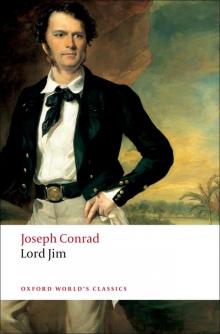 Lord Jim
Lord Jim The Nigger of the Narcissus (Echo Library)
The Nigger of the Narcissus (Echo Library) Victory (Dover Thrift Editions)
Victory (Dover Thrift Editions) Secret Agent
Secret Agent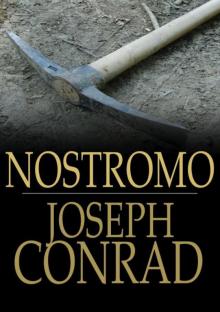 Nostromo
Nostromo Chance: A Tale in Two Parts
Chance: A Tale in Two Parts Youth
Youth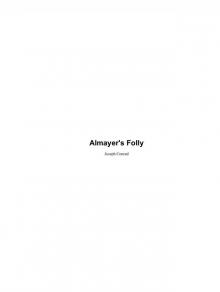 Almayer's Folly
Almayer's Folly The Heart of Darkness and the Secret Sharer
The Heart of Darkness and the Secret Sharer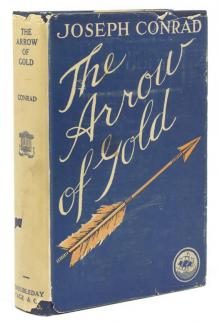 The Arrow of Gold: A Story Between Two Notes
The Arrow of Gold: A Story Between Two Notes The Rescue: A Romance of the Shallows
The Rescue: A Romance of the Shallows The Point Of Honor: A Military Tale
The Point Of Honor: A Military Tale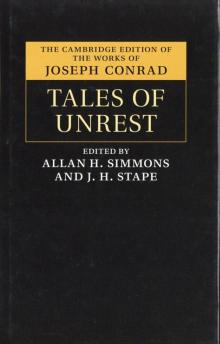 Tales of Unrest
Tales of Unrest Under Western Eyes
Under Western Eyes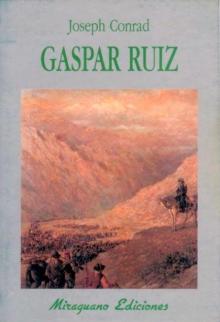 Gaspar Ruiz
Gaspar Ruiz A Set of Six
A Set of Six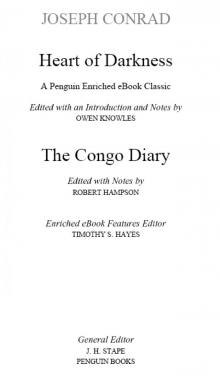 Heart of Darkness and the Congo Diary (Penguin Classics)
Heart of Darkness and the Congo Diary (Penguin Classics) Heart of Darkness and Selected Short Fiction
Heart of Darkness and Selected Short Fiction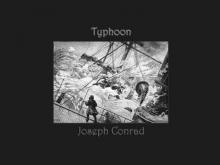 Typhoon
Typhoon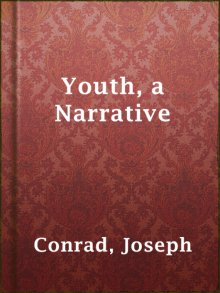 Youth, a Narrative
Youth, a Narrative Tomorrow
Tomorrow The Arrow of Gold
The Arrow of Gold The Shadow Line: A Confession
The Shadow Line: A Confession The Rescue
The Rescue Victory (Echo Library)
Victory (Echo Library) The Brute
The Brute Romance
Romance A Personal Record
A Personal Record Lord Jim: A Tale
Lord Jim: A Tale Heart of Darkness and Selected Short Fiction (Barnes & Noble Classics Series)
Heart of Darkness and Selected Short Fiction (Barnes & Noble Classics Series) Within the Tides
Within the Tides The Secret Sharer and Other Stories
The Secret Sharer and Other Stories Falk
Falk Heart of Darkness and The Secret Sharer
Heart of Darkness and The Secret Sharer Chance
Chance An Anarchist
An Anarchist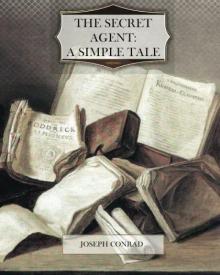 The Secret Agent: A Simple Tale
The Secret Agent: A Simple Tale The Secret Agent
The Secret Agent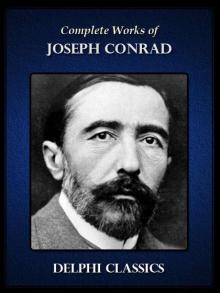 Complete Works of Joseph Conrad (Illustrated)
Complete Works of Joseph Conrad (Illustrated)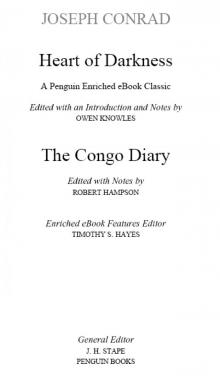 Heart of Darkness and the Congo Diary
Heart of Darkness and the Congo Diary Notes on Life & Letters
Notes on Life & Letters Typhoon (Single Story)
Typhoon (Single Story)